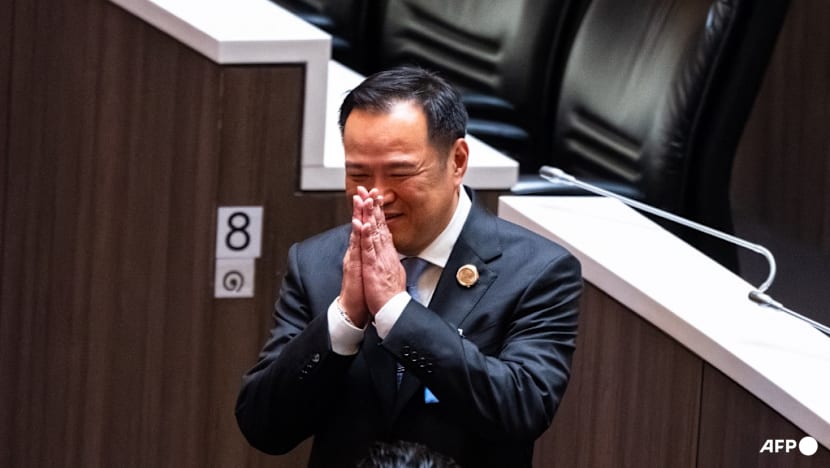Commentary: Who is Thailand’s new prime minister, Anutin Charnvirakul?
Anutin has been manoeuvring to become a “middleman” prime minister for most of the decade since becoming party leader, says a researcher.

Bhumjaithai Party leader Anutin Charnvirakul gestures in the parliament chamber in Bangkok on Sep 5, 2025. (Photo: AFP/Chanakarn Laosarakham)
SYDNEY: The rapid demise of two Thai prime ministers in as many years has paved the way for a third: Anutin Charnvirakul, leader of the third largest party in the Thai parliament, Bhumjaithai.
Who is Anutin, and what does his appointment say about Thailand’s future political stability?
Anutin took over the Bhumjaithai Party from his father in 2014, having already followed his father to become a tycoon in the construction industry.
Bhumjaithai itself dates back to 2008 when its members – a clique within Thaksin Shinawatra’s Pheu Thai party centred around the northeastern province of Buriram – defected from Thaksin’s government, leading to the installation of the conservative Abhisit Vejjajiva government. Mistrust between Bhumjaithai and Thaksin has persisted since.
Anutin has been manoeuvring to become a “middleman” prime minister for most of the decade since becoming party leader. Thai politics is sharply polarised between multiple opposing political factions, with the ever-present threat of intervention from the country’s conservative military elites. These factors mean that the idea of a “middleman” prime minister who could break a political deadlock is always on the cards.
Yet despite Anutin’s dynastic inheritance of a party modelled around strongman leadership in a pocket of the country’s northeast, he must be given credit for his entrepreneurship in expanding his political reach to the national level. His signature policy, decriminalising cannabis, strong campaigning, and his position as health minister during the COVID-19 pandemic helped him not just to survive in the messy world of Thai politics, but to become a well-known national figure.
Aided by a collapse in support for Thailand’s two largest parties, Bhumjaithai grew to 71 seats at the 2023 election, making it the third largest party in parliament, with double the number of seats it had held prior to the 2014 coup.
ANUTIN WILL LEAD A MINORITY GOVERNMENT
Even so, it’s still an oddity in a notional democracy to have the prime minister drawn from the third largest party in parliament.
The proximate cause was the collapse of Thaksin’s Pheu Thai government, led most recently by his daughter Paetongtarn. This collapse left Pheu Thai without a plausible prime ministerial candidate (a quirk of Thailand’s current constitution is that prime ministers must be nominated by parties in advance of national elections, leaving limited room for manoeuvre once parliament has been formed).
This series of events also seems to reflect elite preferences, and the collapse in a “deal” which had enabled Thaksin to return to Thailand from self-imposed exile two years ago.
To avoid a political stalemate that could provide the precondition for an undemocratic intervention, the progressive People’s Party – which has the greatest number of seats in parliament but was blocked from forming government by conservative forces – threw their support behind Anutin. This backing came on the condition that he would dissolve parliament and hold an election within four months.
In the meantime, Anutin will lead a minority government. Presumably, his sole focus will be on entrenching himself as a credible leader, with an eye to performing well in the election.
ELECTION ON THE HORIZON
An election is now on the near horizon. But calling an election in Thailand is akin to throwing the cards in the air in the hope of a more favourable arrangement.
It’s hard to imagine Pheu Thai performing well, after the chaos of its two years in government since 2023, and without an obvious prime ministerial candidate in the wings. This could leave the real race as a two-horse contest between the progressive People’s Party and Anutin’s Bhumjaithai.
Yet even if the People’s Party performs very well, it is uncertain whether it would be permitted to rule.
The title of a 2016 biography of Anutin, whose Thai nickname is “mouse”, translates as “Where there is a hole, there is a mouse”, reflecting the politician’s opportunistic ability to take advantage of any situation.
He would likely not see reaching the prime ministership in the current circumstances as the culminating point of his career. Instead, the position is the ultimate opportunity to burnish his credentials and continue angling for political advantage.
Susannah Patton is Deputy Research Director at the Lowy Institute. This commentary first appeared on Lowy Institute’s The Interpreter.














